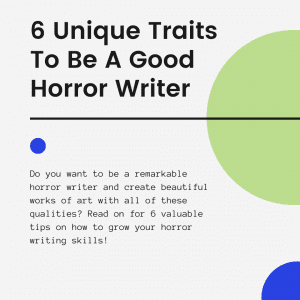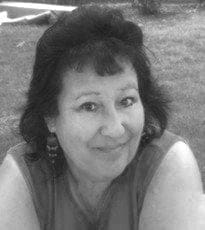6 Unique Traits To Be A Good Horror Writer
 6 UNIQUE TRAITS TO BE A GOOD HORROR WRITER
6 UNIQUE TRAITS TO BE A GOOD HORROR WRITER
According to the Oxford English Dictionary, horror is ‘an intense feeling of fear, shock or disgust’. It flows from the word ‘horrere’ in Latin, which means to shudder or tremble. That’s the simple aim of a horror book – to make the reader shudder or tremble from a mixture of fear, shock, and disgust.
There have been many great horror books that defined the culture of their times, ranging from Mary Shelley’s Frankenstein to Stephen King’s It. All of these great horror stories have some common features that make them stand out from the competition:
- They explore wicked and malevolent phenomena, deeds, and characters;
- They inspire feelings of horror and a sense that things are not what they seem;
- They exalt an intense sense of mystery and unknown, evoking intense moods and emotions;
- They contain shocking and scary reveals and twists;
- They deal with morbid and macabre situations.
Do you want to be a remarkable horror writer and create beautiful works of art with all of these qualities? Read on for 6 valuable tips on how to grow your horror writing skills!
- Use a strong tone
Tone is one of the most important components of a good horror story. The tone and mood are what cause the reader to shiver before the characters even start making bad decisions.
The tone of a story can manifest itself in the descriptions of environments, actions, and movements throughout the story. In horror, you want your tone to be dark and scary. Everything, animate or inanimate, should seem to harbor a dark secret or threaten some gory eventuality.
- Read lots of horror stories
This is as true of the horror genre as it is of pretty much any other genre. Even horror comes in many subgenres, such as paranormal horror, psychological thrillers, and so on. Whatever subgenre you settle on, be sure to read extensively in that subgenre. Do your research about the most respected works and authors in the field and read them. Some of the most famous authors in all of horror include Edgar Allan Poe, Stephen Kind, H.P. Lovecraft, Bram Stoker, Clive Barker, Neil Gaiman, John Lindqvist, and Chuck Palahniuk. Your library should have works by these and other respected writers. You can also find their work online on assignment writing help sites and other places.
It doesn’t just stop at reading celebrated works, though. You should also make detailed notes on what the author excels at. Are they really good at describing settings, creating surprising plot twists, or creating well-motivated villains? Whatever jumps out at you about a particular author’s works, note it down. Write down your favorite quotes from the books and read them when trying to come up with gripping wordplay in your own work. Continuously learning from the best will improve your mastery.
- Your evil characters should be motivated
Malevolence does not occur in a vacuum. It must have a strong and clear motivation. When you reveal the motivations of the evil characters and happenings in your story, it helps makes them more real to the readers and contributes to the mystery of the story.
Whatever the evil force in your story, its motivations should be equal in magnitude to the malevolence of its actions. No one will be terrified by a haunted house that kills people because no one bothered to clean out the attic.
Sometimes going the opposite way can also have the desired effect. Rather than give the malevolent force a strong and clear motivation, give it no motivation at all.
- Use Tragedy to your advantage
Tragedy is a core part of any well-written horror story. Horror is at its best when the story seeks to depict tragedy theatrically and powerfully. Tragedy can be caused by anything, ranging from fundamental flaws in the characters, to a series of bad choices, to the overall nature of reality that makes it impossible for humans to conquer it.
In fact, the horror genre has got so good at using elements of tragedy, and made them so pervasive, that many of these tragedies have evolved into cliches. How many times have you taken a palm to your own face when a character went somewhere they clearly shouldn’t have in the given situation?
One of the things that make horror stories pop is the fact that we can often see what the foolish characters cannot, and so we get scared on their behalf.
There are many examples of tragedy in good horror stories:
- The main character in Stephen King’s Carrie unleashes her terrible powers after prolonged psychological abuse, showing that cruelty can have unforeseen ripple effects.
- It pays to see something from multiple perspectives. A house might be abandoned because property prices are low in the neighborhood, or it has a terrible history, or people are just afraid of it, or all of these.
- Bravery and foolishness are often indistinguishable, and the difference often lies in whether or not the character is aware of the dangers involved.
- Take advantage of common human fears
Since your readers are (presumably) human, your stories should tap into common human fears. According to some sources, the number one human fear is the dentist. Many people feel powerless once they sit in the dreaded dentist’s chair. You could marry this with the pain that comes with some dental procedures to create the dentist from hell. Other common fears include various animals, such as sharks, spiders, and snakes, flying, falling, confined spaces, the dark, and different kinds of environments.
- Horror is not the same as terror
While the two terms are often used interchangeably in daily use, horror and terror are two different things. Horror is fear; terror is extreme fear. In fact, to terrorize is to intimidate others by evoking extreme fear in them. Horror may also include some shock, surprise, and even disgust. Ultimately, you want to terrorize your reader without having to resort to disgust or sick depictions. If you can manage that, then your story is on its way to the bestsellers’ list.
Conclusion
One does not become a superb writer in a day. It takes time, deliberate practice, and a little bit of luck to write something that influences the zeitgeist of its time. The tips above should get you started on your journey. If you keep observing them in your work, you just might be the next great horror writer.
Author Bio
Sherri Carrier is a professional writer and a member of several writing clubs in New York. She has been writing her own poems since she was a child. The young author gets inspiration from her favorite writers and people whom she loves.
- About the Author
- Latest Posts
The Horror Tree is a resource for horror authors which was created in 2011. The main goal when starting the site was to include all of the latest horror anthologies and publishers that are taking paying submissions. A resource useful for both new and experienced publishers alike looking for an outlet for their written material!












